Changing the world
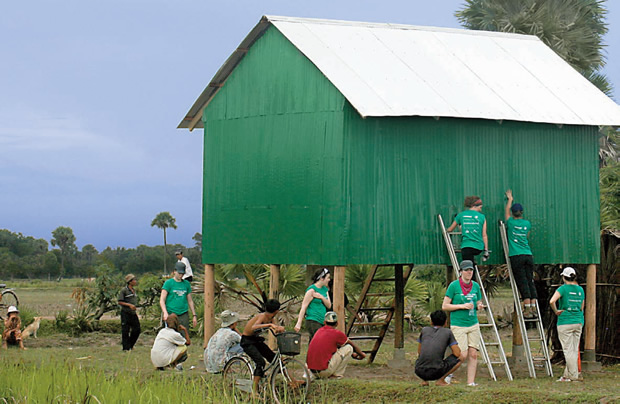
Good news doesn’t sell newspapers. If it did, the good works perpetrated by the Commerce Outreach Commission and its 190+ Commerce student volunteers would be front page news.
The students – 1st-year novices to seasoned 4th-year veterans – manage to juggle their studies and extracurricular activities with doing good deeds such as mentoring grade school children and building houses for the poor in Cambodia.
Michelle Garrett, Com’09, recalls helping a quiet six-year-old girl whose reading level was below her grade level. “She used to be shy. She never talked in class and always kept to herself. After I worked with her during the school year, her reading level improved beyond her grade level. She’s now the most outspoken girl in the
class! It’s great to see that confidence in her,” Michelle laughs.
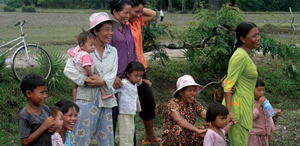 Commerce volunteers’ housebuilding efforts (left) entertain the locals (above).While Commerce students have a long tradition of giving back to their community through raising funds for local shelters, food banks and other good causes, recent classes have taken up the cause in a more organized way. The Commerce Society (ComSoc) established the Outreach Commission in 2005, not coincidentally just one year after the School launched its Certificate in Corporate Social Responsibility (CCSR) program. One of the four primary requirements of this optional program is that students complete a total of 60 hours of ‘approved outreach activities’ throughout their four years of study, in addition to other requirements (see sidebar on page 24).
Commerce volunteers’ housebuilding efforts (left) entertain the locals (above).While Commerce students have a long tradition of giving back to their community through raising funds for local shelters, food banks and other good causes, recent classes have taken up the cause in a more organized way. The Commerce Society (ComSoc) established the Outreach Commission in 2005, not coincidentally just one year after the School launched its Certificate in Corporate Social Responsibility (CCSR) program. One of the four primary requirements of this optional program is that students complete a total of 60 hours of ‘approved outreach activities’ throughout their four years of study, in addition to other requirements (see sidebar on page 24).
Recognizing the range of student interests and breadth of opportunities to give back, the Commission organized its activities around four major initiatives:
- Commerce Charity Cup hockey tournament that raises money for cancer research and treatment;
- Commerce Kids that partners with Kingston elementary schools to mentor local school children;
- Queen’s Commerce Outreach that provides volunteer opportunities for students, locally and internationally, while also leading fundraising efforts for established charities; and the
- Equity Issues Committee that works to ensure all Commerce students feel welcomed at Goodes Hall, regardless of their background, gender, ethnicity, religion, or sexual orientation.
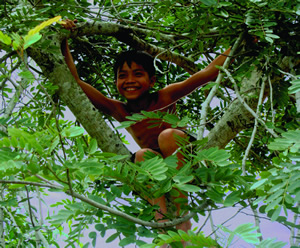 The 40 students who serve on these committees and the 150+ who volunteer are making a difference, according to Commerce Program Director Shannon Goodspeed. “We’re so used to seeing students at tables in the Atrium raising funds for charities, or fundraising for their own outreach initiatives, that we almost take it for granted,” she reflects. “That’s just the tip of the iceberg, though, because they’re just as active in donating their time to local and international charities and in raising awareness. They’re passionate about so many causes – child literacy, the environment, poverty in the developing world – it’s really inspirational to see them in action.”
The 40 students who serve on these committees and the 150+ who volunteer are making a difference, according to Commerce Program Director Shannon Goodspeed. “We’re so used to seeing students at tables in the Atrium raising funds for charities, or fundraising for their own outreach initiatives, that we almost take it for granted,” she reflects. “That’s just the tip of the iceberg, though, because they’re just as active in donating their time to local and international charities and in raising awareness. They’re passionate about so many causes – child literacy, the environment, poverty in the developing world – it’s really inspirational to see them in action.”
Second-year Commerce student Annetta Ho recently got the low-down on the four groups that make up the Outreach Commission and reports in the following pages.
The Commerce Charity Cup
As with so many good ideas, this one started with one person’s ‘light bulb’ moment. Inspired by Organizational Behaviour Professor John Phelan’s class-ending exhortation, “Go out and make a difference,” Jared March, BCom’06, decided to do just that. The news of his father’s cancer diagnosis in 2004 motivated him to establish the Commerce Charity Cup (CCC) hockey tournament to raise money for the Cancer Centre of Southeastern Ontario at Kingston General Hospital. What has become an annual tournament pits teams from York’s Schulich, Western’s Ivey, McGill’s Desautels business schools and QSB in a fun tourney that manages to stir the competitive juices of all involved. Over the past four years, the CCC has raised more than $75,000 through such events as a silent auction and a ‘Hockey Night in Commerce’ at a local watering hole, the Ale House.
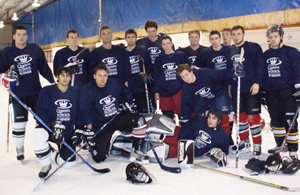 “Because we have to turn a profit to make a donation, keeping costs low are really important in our operations,” explains incoming co-chair Mike Costas, Com’10. The challenge this year was finding a new venue to hold the tournament, given the demolition of Jock Harty Arena. The committee turned its sights to Montréal, where the tournament was held in January. The relocation meant additional transportation and accommodation costs, but co-chair Andrew Cyr, Com’10, believes it was worth it.
“Because we have to turn a profit to make a donation, keeping costs low are really important in our operations,” explains incoming co-chair Mike Costas, Com’10. The challenge this year was finding a new venue to hold the tournament, given the demolition of Jock Harty Arena. The committee turned its sights to Montréal, where the tournament was held in January. The relocation meant additional transportation and accommodation costs, but co-chair Andrew Cyr, Com’10, believes it was worth it.
“I think more people knew about it because we were going to Montréal,” he explains. “At the ComSoc Appreciation Dinner, we were given the award for Most Innovative Internal Committee. I’m proud that we were able to turn a challenge into an opportunity.”
Plans for next year include inviting members from the Kingston community to strengthen the Queen’s-Kingston relationship and to create a unified effort for a cancer-fighting cause that benefits all. “The benefit of donating locally is that you get to see the tangible results from your donation,” Mike explains. “I used to think that when you donated money that would be the end of it, but Kingston General Hospital sends you a letter saying exactly what they bought with your money.You get to know that you’re making a difference.”
Commerce Kids
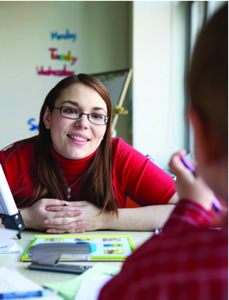 Local community involvement is also part of Commerce Kids’ philosophy. Started more than ten years ago, Commerce Kids partners with three local elementary schools to assist children with their learning and personal development.
Local community involvement is also part of Commerce Kids’ philosophy. Started more than ten years ago, Commerce Kids partners with three local elementary schools to assist children with their learning and personal development.
Commerce student volunteers might spend part of the day tutoring children in English, math or science, then supervise games during recess. They also help teachers ensure that proper attention and care is given to every child, especially when classes are overcrowded. Michelle Garrett, incoming co-chair, believes getting off campus and giving back to the community can provide a refreshing outlook on life.
“The general message I try to give people is that there’s more to life than Goodes Hall. We’re here Monday to Friday, and whether you get 80 percent or 90 percent on a test, in the grand scheme of things it really doesn’t matter. Working with kids and helping them develop really puts things in perspective.”
A new project that Commerce Kids started last year is Queen’s Young Women in Leadership in collaboration with Queen’s Women In Leadership (QWIL). QWIL organizes conferences to empower women and inspire them to assume leadership roles in society. Organizers welcomed nearly 65 grade 7 and 8 girls to Goodes Hall, where they attended workshops and participated in case studies.
“There was lots of positive feedback,” recalls Michelle.“The girls loved the experience and gift bags. All the leadership discussions were very inspiring.”
Michelle hopes that the Commerce Kids program will continue to expand next year and that even more students will sign up to be volunteers.
“We really just want to get the word out. I think when kids wait all week to see you and shout out your name when they do, you’ll know that you’ve really made a difference in someone’s life.”
Queen’s Commerce Outreach
Harnessing the idealistic impulses of a student body of 1,170 is a challenge in itself. The objective of Queen’s Commerce Outreach (QCO) is to provide an outlet for students who want to volunteer their services to a variety of good causes.
The group’s website features a comprehensive listing of volunteer opportunities, all of which are CCSR-approved, which means students participating in the program can count those volunteer hours towards their CSR certificate. Students can volunteer to be companions to Alzheimer’s patients, or bingo volunteers for local Canadian Diabetes Association fundraisers, or Big Brothers or Big Sisters. The site is easy to use and enables an internet-savvy generation to find their volunteer niche with the click of a mouse.
Not only does the QCO promote volunteerism within the local community, it also extends to the global village. This year, the group raised funds to supplement the travel costs of 20 students who travelled to Cambodia in the spring to build 10 new homes for families living in extreme poverty. The Cambodia trip was undertaken in conjunction with Tabitha Foundation, a non-profit, non-denominational Christian organization that helps communities in need around the world.
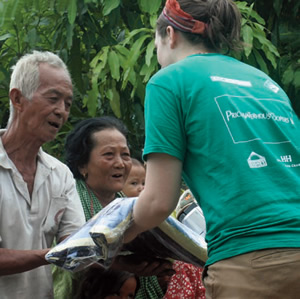 undefined Chris Henry, Com’10, believes the Cambodia trip will be the highlight of his time with QCO. “I really think our favourite moments will come from this trip abroad. We’ve put so much hard work into it and it’s just great to see how excited people are.”
undefined Chris Henry, Com’10, believes the Cambodia trip will be the highlight of his time with QCO. “I really think our favourite moments will come from this trip abroad. We’ve put so much hard work into it and it’s just great to see how excited people are.”
In a creative twist, the QCO formed a consulting team that works closely with Tabitha Foundation to develop solutions for its cottage-goods business. These goods – silk handbags and accessories, copper jewelry, etc. – are produced in Cambodian homes and sold in Canada to raise money for the house-building projects. Currently, the foundation lacks a central distribution system, so QCO is investigating an e-commerce solution.
“This way, students interested in consulting get to apply what they’ve learned in school to improve the welfare of struggling individuals,” Chris explains.
Aside from facilitating volunteering, the QCO fundraises for non-profit organizations, deciding each year which charitable organizations to support. This year, there were two. The committee decided to participate in the Canadian Landmine Foundation’s Night of 1000 Dinners and also donated to the Heart and Stroke Foundation.
One of QCO’s major accomplishments was being able to attract PricewaterhouseCoopers to sponsor its events next year. “Internal committees rarely get support on this scale from major companies. It’s great to see them getting involved in CSR projects such as ours,” says Chris.
Equity Issues Committee
Philanthropy and volunteerism are only part of the Outreach Commission’s mission. The Equity Issues Committee (EIC) aims to address fairness and human rights issues closer to home. The purpose of the EIC is to ensure that all students feel welcome at Goodes Hall, regardless of their background, gender, ethnicity, religion, or sexual orientation.
One of its first initiatives was to establish a mentorship program to reach out to students struggling with adjusting to Queen’s. The mentorship program pairs students with EIC executive members for informal discussions on issues students are facing in adjusting to university life. In addition, some mentors participated in Queen’s Positive Space training program to enable them to provide information and support to lesbian, gay, bisexual, transgender and queer (LGBTQ) students. The EIC hopes to partner with more groups on campus that share complementary goals, similar to its collaboration with the University’s Muslim Student Association to set up an information booth on Islam for one week in Goodes Hall last November.
EIC also conducted its first Equity Assessment Survey to determine students’ attitudes towards diversity issues and how these issues were being handled by ComSoc. The survey was intended to gauge how comfortable students felt in their own skin. The committee has already received numerous suggestions from students regarding improvements to ComSoc policies and culture. Sikandar Ali, BCom’08, adviser to and member of EIC, feels that the committee plays a critical role.
“A lot of things we do are behind the scenes. We don’t always get as much attention as the other committees, but I do believe that what we’re doing is fundamentally important here. We’re helping students adapt to a different curriculum or an unfamiliar culture, and we help them be at peace with their identities.”
